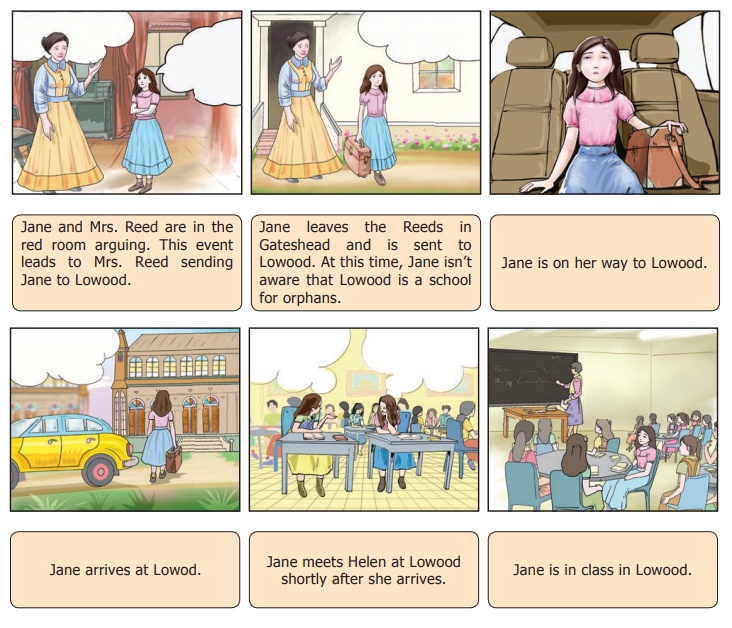English : Term 3 Unit 3 : Play : Jane Eyre
Warm Up
Every child has a right to an education, a life free from poverty and protection from abuse.
Look at the picture
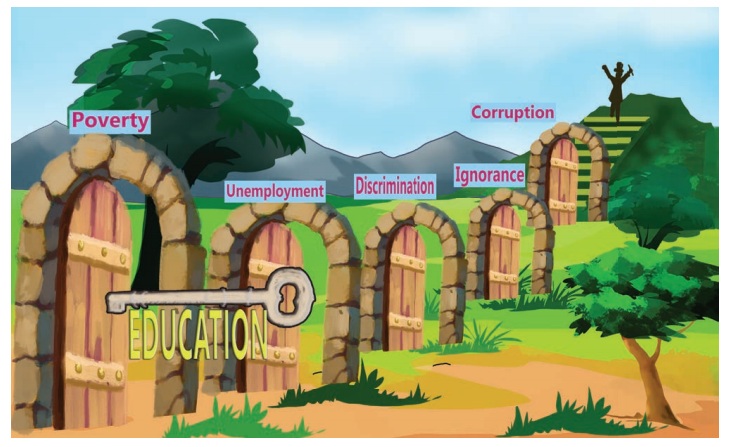
Discuss in pairs and answer
1. What are the basic human rights?
(a) Right to Equality
(b) Right to Freedom
(c) Right against Exploitation
(d) Right to Freedom of Religion, Culture and Education.
(e) Right to Constitutional Remedies.
2. What is education?
Answer: Education is the process of getting knowledge, skills, values, beliefs and habits.
3. Why do we need education?
Answer: Education gives us a knowledge of the world around us and changes it into something better. It helps us build opinions and have points of view on things in life.
Think and Answer
1. How would life be on this planet if some of the human rights are excluded?
Answer: Life on this planet would become more difficult for the commoners, if some of the human rights are excluded.
2. Are there any rights you would still like to add to the human rights list?
Answer: I would like to add ‘the right to own your things, Freedom of thought and expression, right to social security and right to play’, to the human rights list.
Discuss and Answer
Discuss and Answer
1. Why does Jane want to go to school or learn anything in the first place?
Answer: Jane wants to learn life’s lessons that shape her character as an adult.
2. Why does education become such an important issue for her as a child?
Answer: Education becomes such an important issue for Jane because education takes place for every single one of her emotional and physical needs – food, shelter, family and friendship.
3. What does Jane’s education at Lowood prepare her to do?
Answer: Jane’s education at Lowood prepares her to understand the world in terms of a teacher-student relationship.
Chew on This
Try on an opinion or two and start a debate
In Jane’s childhood, education takes the place of every single one of her emotional and physical needs—food, shelter, family, and friendship. Because Jane initially learns to understand the world in terms of a teacher—student relationship, all her friendships have some master—pupil tinge to them.
Vocabulary
Semantic Map
A. Read the list of words. Write down all the words related to those words. Create a “map” using a graphic organizer and discuss it in groups. One is done for you.
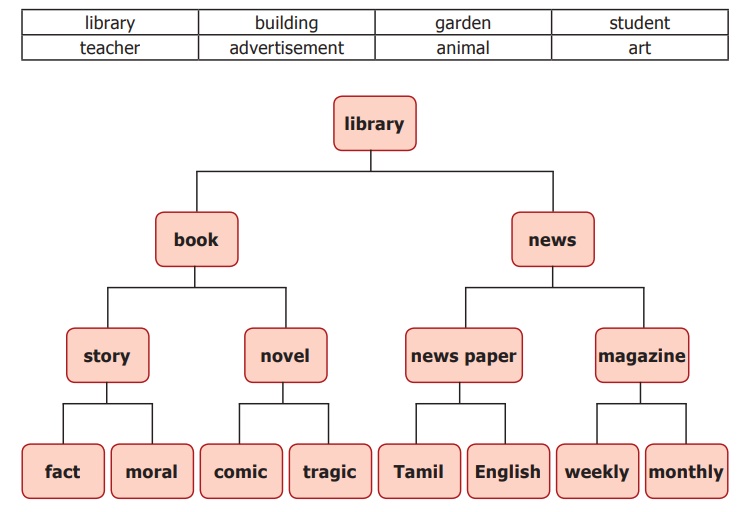
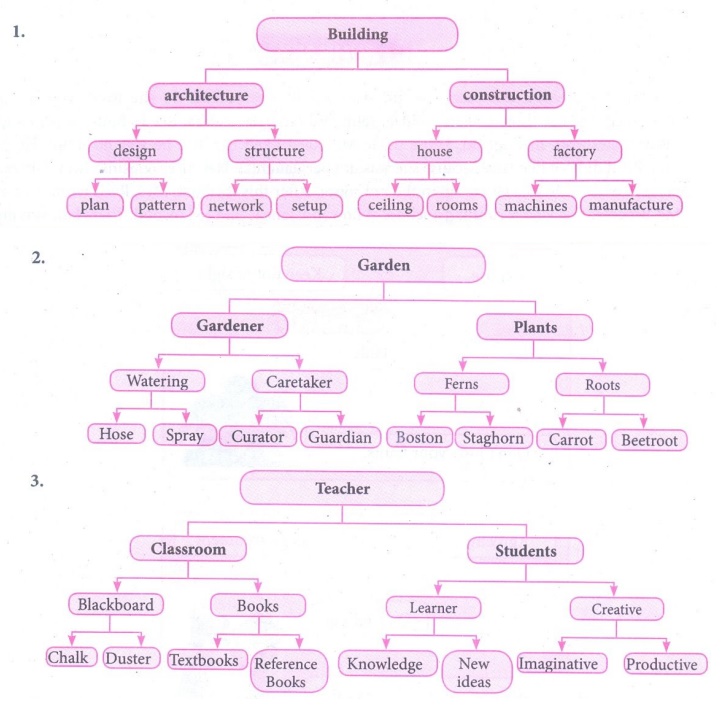
Vocabulary Frame
B. Look at the list of words. Read the instructions and make Vocabulary Frames.
notice | hide | quarrelling | quickly | tired | wide | pretty | threw
Top Right Corner : Write the word’s definition.
Top Left Corner : Write the word’s opposite.
Lower Left Corner : Write a sentence that uses the definition of the word.
Lower Right Corner : Draw a graphic to help you visualize the concept.
In the Centre : Write the word.
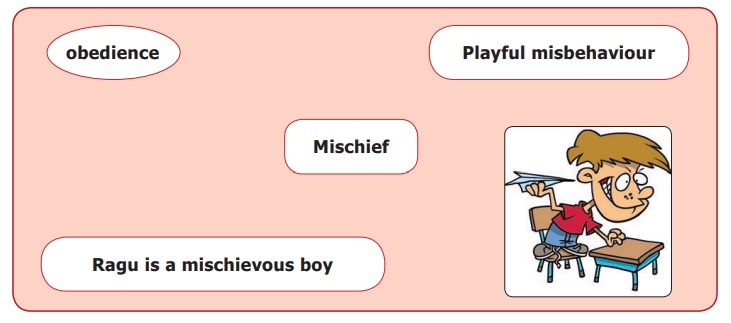
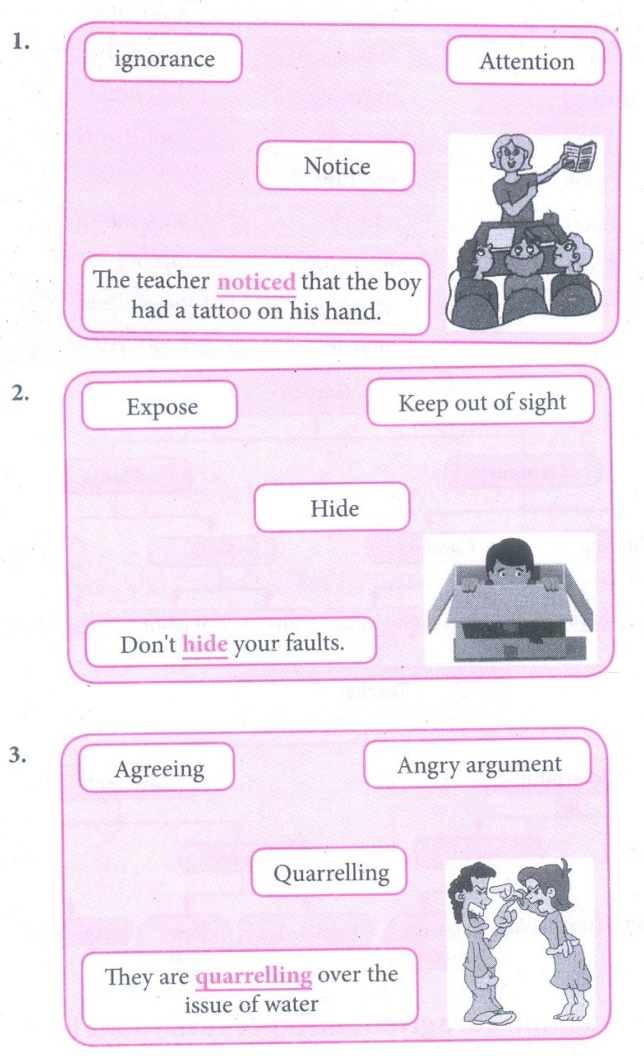
Syllable
C. Fill in the table with monosyllabic, disyllabic and trisyllabic words from the play ‘Jane Eyre’.
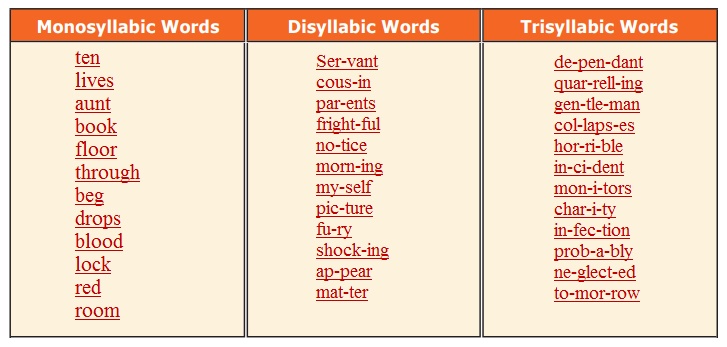
Monosyllabic Words
ten
lives
aunt
book
floor
through
beg
drops
blood
lock
red
room
Disyllabic Words
Ser-vant
cous-in
par-ents
fright-ful
no-tice
morn-ing
my-self
pic-ture
fu-ry
shock-ing
ap-pear
mat-ter
Trisyllabic Words
de-pen-dant
quar-rell-ing
gen-tle-man
col-laps-es
hor-ri-ble
in-ci-dent
mon-i-tors
char-i-ty
in-fec-tion
prob-a-bly
ne-glect-ed
to-mor-row
Listening
D. Listen to the conversation between a father and daughter and say whether following statements are true or false.
Dad: This is going to be a great camping trip. I haven’t been to this mountain since
I was a young boy. Oh, I remember how peaceful it was and how great everything smelled. And the fishing was fantastic! My brother and I used to catch huge fish and fry them over the fire.
Daughter: Yeah, Dad, we’ve heard this story since we were babies. We know- peacefulscenery, good smell, fish, everything. I’m glad we’re finally going to go so you can relive your old memories. You aren’t going to make me fish with you though, are you?
Dad: Of course you are going to fish. You’ll love it! Putting the worm on the hook… standing out in the cold water… waiting until the fish take a bite. Hmm… on second thought, maybe you won’t like it so much. Why don’t you just cook the fish for tonight’s dinner?
Daughter: I guess I could do that. Anyway, when are we going to be there? I feel likewe’ve been driving for hours.
Dad: It’s just around this corner. You’ll really love it. Hey, wait a minute! What’s this shopping center doing in my old fishing spot?
1. Dad hasn’t been to this fishing spot since last year. [Answer: False]
2. Dad used to go fishing with his father. [Answer: False]
3. Dad has talked a lot about this fishing spot in the past. [Answer: True]
4. The daughter also loves to fish. [Answer: True]
5. Dad says his daughter MUST fish. [Answer: False]
6. The daughter is going to cook the fish. [Answer: True]
7. Dad’s fishing place hasn’t changed since he was a boy. [Answer: False]
Speaking
E. Imagine that below are some of the paintings of Jane Eyre. Discuss with your partner and describe the paintings.
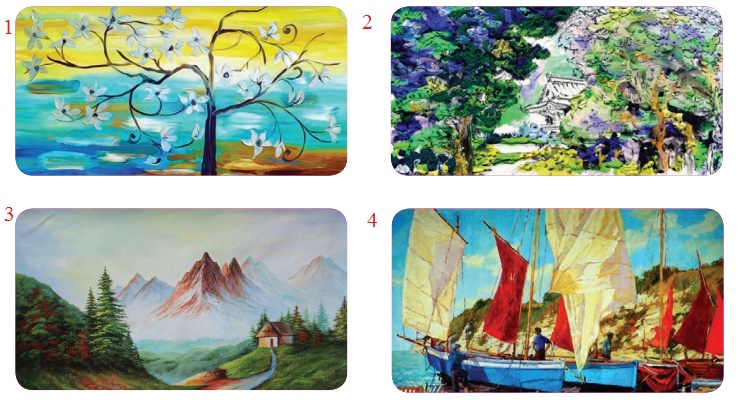
Answer:
1. This painting of a tree with white flowers looks beautiful. The colours used to paint it is fantastic. When we look at it, we feel joy in her hearts.
2. This painting of greenery everywhere with colourful flowers looks beautiful. The scenery with some trees and a lonely house between the trees looks amazing.
3. This painting of snow-covered mountains with a but on top of a raised area is fantastic. It has some pine trees and a path leading to the hut.
4. This painting shows clearly a huge boat with some fishermen getting ready to go to the sea. The blue boat with colourful sails looks like a real photograph.
Role play
F. Put students into groups of three and let them act as Jane.
Student A: You are Jane. You live with the Reeds. Tell the other students about yourlife there.
Student B: You are Jane. You have been at Lowood School for a few months. Tell theother students about your life there.
Student C: You are Jane. You are eighteen. You are going to work at Thornfield Hall asa teacher. Tell the other students about your hopes for your life.
After this, decide who is the unhappiest of the three ‘Janes’.
Answer:
Student 1 : I am Jane. As my parents died, I had to live with my uncle and aunt Mr. and Mrs. Reed in a town called Gateshead. My three cousins Eliza, John and Georgiana ill-treated me. After my uncle’s death, my aunt did not look after me as her daughter. She always locked me up in a red room. Besides, the maid had to listen to my aunt and did, as was told by her. My aunt wrote a letter to Mr. Brocklehurst and sent me to Lowood.
Student 2 : At Lowood, I met Miss. Muller and Miss. Temple. They put me in the fourth form. There, I got a new companion Helen Burns, who told me that their school was a charity school for the orphans. But after some time, Helen got ill and passed away leaving me alone in Lowood. I spent eight years in school – six years as a student and two years as a teacher. I wanted liberty. So I advertised in Herald for situations. A week later, I received a letter from Mrs. Fairfax, Thornfield, for a job.
Student 3 : There, at Thornfield, I was asked to teach Miss. Adela. She was Mr. Rochester’s ward. I liked Thornfield very much. I told Adela that I would teach her about nature, animals and flowers. We can study all we can that isn’t in books. I believe that art is the window of the soul. So I started teaching Adela and led a new life in Thornfield.
After this, decide who is the unhappiest of the three ‘Janes’.
Answer: The unhappiest of the three ‘Janes’: ‘Jane’ who lived with Mrs. Reed, at Gateshead.
Reading
G. Read the story and fill in the grid by ticking each character’s qualities.
Discuss in pairs to rate the characteristic and give marks from 1 to 10 depending on the grade of each quality.
Justify your views in one or two sentences.
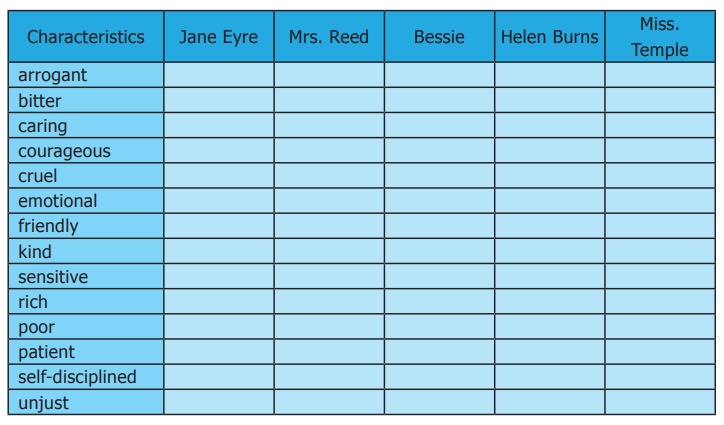
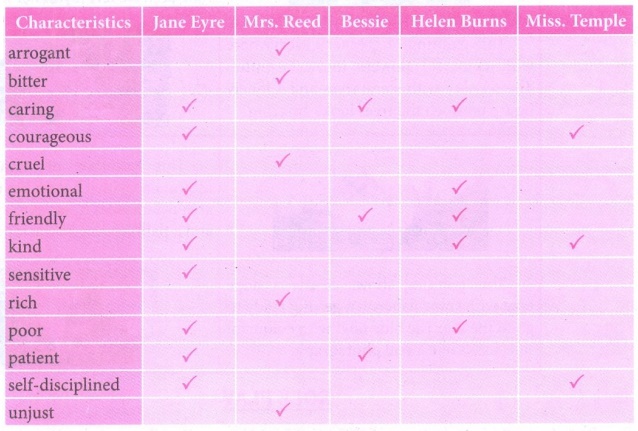
Marks
Kind : 10 Marks
Patient : 7 Marks
Emotional : 4 Marks
Rich : 1 Mark
Self – disciplined : 9 Marks
Courageous : 6 Marks
Sensitive : 3 Marks
Friendly : 8 Marks
Caring : 5 Marks
Poor : 2 Marks
A Person should always be kind, self – disciplined and friendly to others.
Writing
H. Arrange the jumbled sentences and write a paragraph. Use appropriate conjunctions.
Jane Eyre is an orphan.
She lives with her aunt Mrs. Reed.
Mrs. Reed does not like Jane because Jane is not her daughter.
Jane’s uncle Mr. Reed likes Jane, but he dies.
He makes Mrs. Reed promise to take care of Jane, but instead she sends Jane away.
Jane is ten years old, she is sent to Lowood school.
Jane graduates and stays there to teach.
She leaves for Thornfield, where she is a governess.
She is very happy there.
Answer: 1, 2, 4, 3, 5, 6, 7, 8, 9
Jane Eyre is an orphan. So she lives with her aunt and uncle Mr. and Mrs. Reed. Jane’s uncle Mr. Reed likes Jane, but he dies. Mrs. Reed does not like Jane because Jane is not her daughter. Before his death, Uncle Reed makes his wife promise to take care of Jane, but instead she sends her away. As Jane is only ten years old, she is sent to Lowood school. As, Jane gets graduated herself, she stays there to teach. From there, she leaves for Thornfield, where she becomes a governess. She is very happy there.
I. Read scene I. Discuss with your partner what Mrs Reed might write about Jane in her letter to the owner of a school. Now complete her letter to Mr. Brocklehurst.
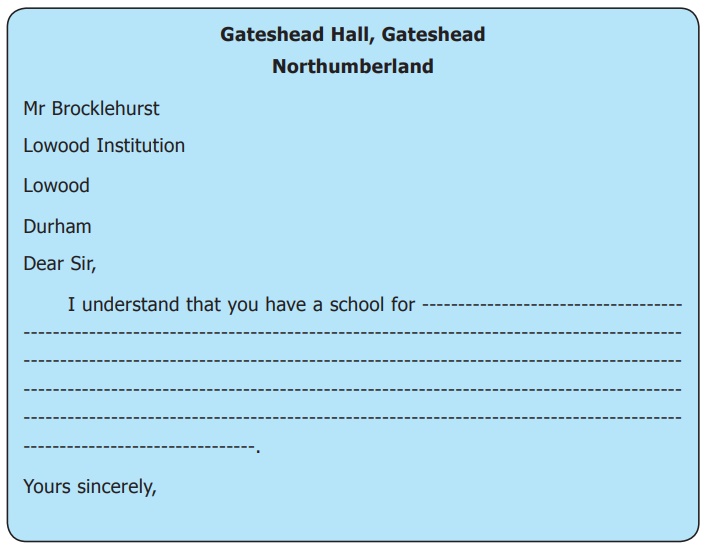
Gateshead Hall, Gateshead Northumberland
Mr Brocklehurst
Lowood Institution
Lowood
Durham
Dear Sir,
I understand that you have a school for the orphans. My niece, Miss. Jane Eyre, who is ten years old, is an orphan. She lost her parents. I am finding it difficult to bring her up here. So I request you to admit her in your charity institution. If you permit to take her, I will send her to Lowood.
Thank you.
Yours sincerely,
Mrs. Reed.
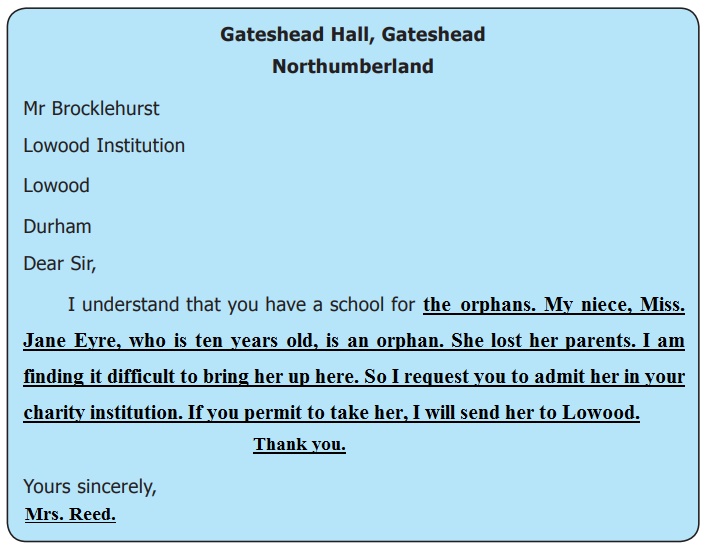
Grammar
Determiners
J. Read the passage. Choose between a little, a lot of, a few, few, fewer, many and much to fill in the gap.
DON’T CALL US, WE’LL CALL YOU!
Two years ago, I moved to a new neighbourhood. There seemed to be very few people in this area without telephones, so I expected to get a new phone quickly. I applied for one as soon as I moved into my new house. ‘We aren’t supplying a lot of new phones in your area’, an engineer told me. ‘A few people want new phones at the moment and the company is employing fewer engineers than last year so as to save money. A new phone won’t cost you much money, but it will take a little time. We can’t do anything for you before December. ‘You need a lot of patience if you’re waiting for a new phone and you need many friends whose phones you can use as well. Fortunately, I had both. December came and went, but there was no sign of a phone. I went to the company’s local office to protest. ‘They told me I’d have a phone by December,’ I protested. ‘Which year?’ the assistant asked.
Perfect Tenses
K. Read the Time Line of Harish. Write sentences using the present perfect tense.
* 1971 – Harish is born in Maduari.
* 1976 – Harish and his family move to Chennai.
* 1993 – Harish finishes college and starts working for Indian Oil.
* 1996 – Harish is promoted as a manager at Indian Oil.
* 1997 – Harish meets Amina.
* 2000 – Harish and Amina get married.
* 2001 – They have a child.
Answer:
1. Harish has been born in Madurai in 1971.
2. Harish and his family have moved to Chennai in 1976.
3. In 1993, Harish has finished college and started working for Indian Oil.
4. In 1996, Harish has been promoted as a manager at Indian Oil.
5. Harish has met Amina in 1997.
6. Harish and Amina have got married in 2000.
7. They have had a child in 2001.
I. Read the following passage and fill in the blanks with the correct form of the verb.
Where had I gone? What had I done?
What had I seen?
I had never seen (see) such beautiful sights before I visited Paris in 2012. I had saved (save) money for five years before I booked my trip to Paris. I was very excited! Before my trip to Paris, I had never been (be) out of India.
When I went to Paris, I spent many days touring the city. The city was big. Sometimes I got lost and asked for directions. I asked for directions in French. That was easy because I had studied (study) French for two years before I visited Paris.
By the time I left Paris, I had toured (tour) many beautiful places. The Eiffel Tower, the Notre Dame Cathedral, and the Luxembourg Gardens were just a few of the places I saw. Before I visited Paris, I had only seen(see) those places on television.
Prepositions
M. Look at the picture and write eight sentences using prepositions.
Where is the rabbit?
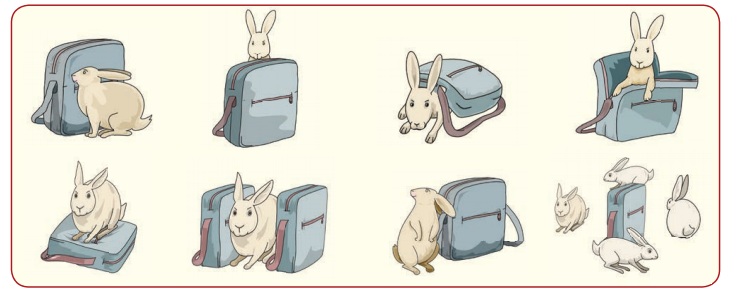
Answer:
1. The rabbit is in front of the bag.
2. The rabbit is behind the bag.
3. The rabbit is under the bag.
4. The rabbit inside the bag.
5. The rabbit is on the bag.
6. The rabbit is between two bags.
7. The rabbit is near the bag.
8. The rabbits are running around a bag.
Comparative and Superlative Survey
N. Answer the questions below. Write your answers in the second column of the table.
a. How old are you?
b. How tall are you?
c. What bicycle do you have?
d. How many languages do you speak?
e. At what time do you usually wake up?
f. How far is your home from school?
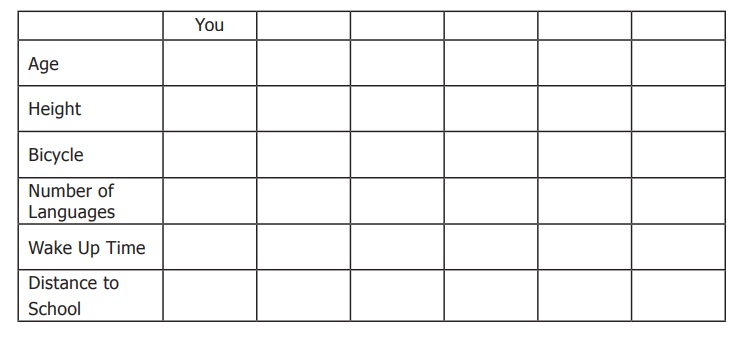
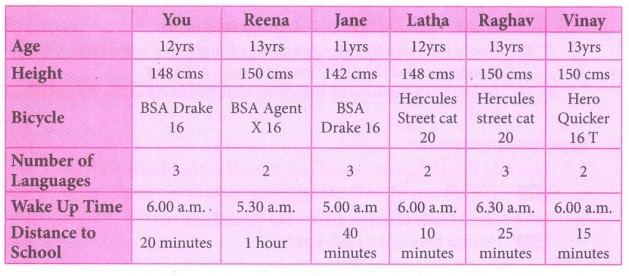
O. Work in groups of six. Write the other students’ names at the top of the table. Interview each student using the above questions and complete the table with their answers.
When you have all the answers, use the results to write three comparative and three superlative sentences about the students in your group.
Examples:
I am the oldest in my group.
My bicycle is more colourful than Jane’s bicycle.
Answer:
1. I am younger than Reena.
2. Vinay is older than me.
3. Reena gets up earlier than Latha.
4. My bicycle is the most attractive one.
5. Latha’s home is the nearest one to the school.
6. Jane is the youngest in her class.
Passive Voice
P. Read the following article about the amazing similarities between the assassination of John F. Kennedy and Abraham Lincoln; then underline the passive forms.
Abraham Lincoln was elected to Congress in 1846. Voters elected John F. Kennedy to Congress in 1946.
Lincoln was elected president in 1860. Voters elected Kennedy president in 1960.
Both men were particularly concerned with civil rights.
Both wives lost their children while living in the White House.
Lincoln was shot on a Friday. Someone shot Kennedy on a Friday.
Lincoln was shot in the head. The gunman shot Kennedy in the head.
Lincoln’s secretary was called Kennedy. Kennedy’s secretary was called Lincoln.
Lincoln was assassinated by a Southerner. A Southerner assassinated Kennedy.
Lincoln was succeeded by a Southerner named Johnson. A Southerner named Johnson succeeded Kennedy.
Andrew Johnson, who succeeded Lincoln, was born in 1808.
Lyndon Johnson, who succeeded Kennedy, was born in 1908.
John Wilkes Booth, who assassinated Lincoln, was born in 1839. Lee Harvey Oswald, who assassinated Kennedy, was born in 1939.
Both assassins were known by their three names and both names are composed of fifteen letters.
Lincoln was shot at a theatre named “Ford”. The gunman shot Kennedy in a car called a “Lincoln” that the company Ford made.
Booth ran from the theatre and was caught in a warehouse. Oswald ran from a warehouse and the police caught him in a theatre.
Booth was assassinated before his trial. Someone assassinated Oswald before his trial.
Answer:
1. Abraham Lincoln was elected to Congress in 1846. Voters elected John F. Kennedy to Congress in 1946.
2. Lincoln was elected president in 1860. Voters elected Kennedy president in 1960.
3. Both men were particularly concerned with civil rights.
4. Both wives lost their children while living in the White House.
5. Lincoln was shot on a Friday. Someone shot Kennedy on a Friday.
6. Lincoln was shot in the head. The gunman shot Kennedy in the head.
7. Lincolns secretary was called Kennedy. Kennedy’s secretary was called Lincoln.
8. Lincoln was assassinated by a Southerner. A Southerner assassinated Kennedy.
9. Lincoln was succeeded by a Southerner named Johnson. A Southerner named Johnson succeeded Kennedy.
10. Andrew Johnson, who succeeded Lincoln, was born in 1808.
11. Lyndon Johnson, who succeeded Kennedy, was born in 1908.
12. John Wilkes Booth, who assassinated Lincoln, was born in 1839. Lee Harvey Oswald, who assassinated Kennedy, was born in 1939.
13. Both assassins were known by their three names and both names are composed of fifteen letters.
14. Lincoln was shot at a theatre named “Ford”. The gunman shot Kennedy in a car called a “Lincoln” that the company Ford made.
15. Booth ran from the theatre and was caught in a warehouse. Oswald ran from a warehouse and the police caught him in a theatre.
16. Booth was assassinated before his trial. Someone assassinated Oswald before his trial.
Reported Questions
1. Jane told Bessie that she would hide herself in the library with Uncle Reed’s book.
Answer: “I’ll hide myself in the library with uncle Reed’s book”.
2. John ordered Jane to come there when he called her.
Answer: “Come here when I call you.”
3. Eliza asked Jane what she was doing then.
Answer: “What are you reading now?”
4. Mrs. Reed told Bessie to take her away to the red room and lock her in there.
Answer: “Take her away to the red room and lock her in there!”
5. Miss. Temple asked Jane whether she could read and write.
Answer: “Can you read and write?”
6. Miss. Miller asked Miss. Temple where she should put Jane.
Answer: “Where shall I put her Miss. Temple?”
7. Jane asked Helen why they called it an institution.
Answer: “And why do they call it institution?”
8. Helen asked Jane why she had come there.
Answer: “Why have you come here, Jane?”
9. Jane asked Mrs. Fairfax whether she would have the pleasure of seeing Miss. Fairfax that night.
Answer: “Shall I have the pleasure of seeing Miss. Fairfax tonight?”
10. Miss. Adela told Jane that she could sing and dance also.
Answer: “I can sing and dance also. Shall I?”
Connecting to Self, Project
CONNECTING TO SELF
R. Case Study
* In Charlotte Bronte’s day, many orphans were sent to institutions like Lowood.
* Conduct research to find out what options exist today for children without parents.
* Refer books and Internet resources as well as children’s services department in India.
* Then, prepare two or three case studies, or profiles, using made-up names, that present typical situations.
PROJECT
S. Look at the story board. Read the captions given under each frame.
Fill the bubbles and complete the story board.
* Create your own story board for the scene ‘At Thornfield’.
* Make a power point presentation using the story board.
